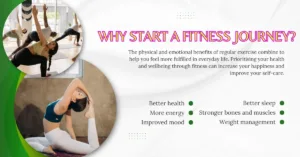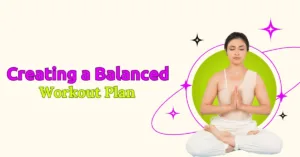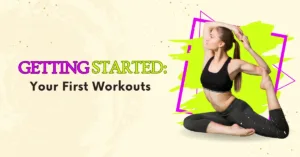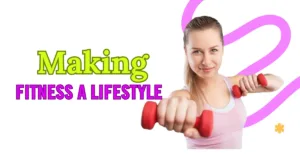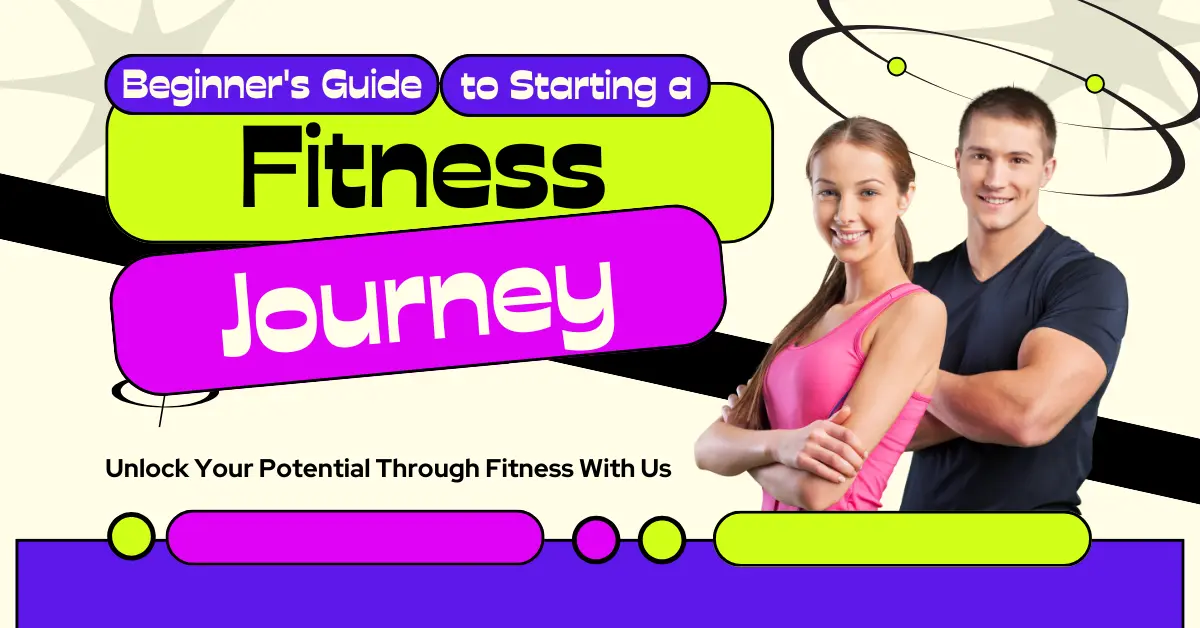
Beginner’s Guide to Starting a Fitness Journey
- 46
- 0
- 0
Starting your fitness journey can be fun and rewarding! Begin by setting simple goals, like working out a few times a week. Choose activities you enjoy, such as walking, biking, or dancing. Make a schedule to help you stay on track and slowly increase your workout time. Make sure to warm up before your workout and cool down afterward. Listen to your body and rest when you need to. Keep a positive attitude and acknowledge your progress, regardless of how small it may be.
Beginner’s Guide to Starting a Fitness Journey
You don’t have to join a gym to start your fitness journey. You can add movement to your daily routine by walking or doing home workouts with bodyweight exercises. Establish achievable goals and choose activities that you love. Staying consistent is important, and even small efforts can lead to big improvements.
Why Start a Fitness Journey?
Starting a fitness journey can be one of the best decisions you make for yourself. It’s not only about looking great—it’s about feeling great and leading a healthier lifestyle. Here are some great reasons to begin your fitness journey & you can say beginner’s guide to starting a fitness Journey.
Better Health
Regular exercise helps your body in many ways. It can lower your risk of heart disease, diabetes, and other health problems. When you exercise, your body becomes stronger and better at fighting off illnesses.
More energy
You might think exercise would make you tired, but it gives you more energy throughout the day. When you work out regularly, your body becomes more efficient at using energy, so you feel less tired doing everyday tasks.
Improved mood
Exercising is an excellent way to lift your spirits. When you work out, your brain releases chemicals that make you feel happier and less stressed. Many people find that regular exercise helps them feel more positive and confident.
Better sleep
If you have trouble sleeping, starting a fitness routine might help. Regular exercise can help you fall asleep faster and sleep more deeply. Just be sure not to exercise too close to bedtime, as it might make you feel too awake.
Stronger bones and muscles
Exercise, especially strength training, helps build and maintain strong bones and muscles. This is important for everyone, but it’s especially crucial as we get older. Strong bones and muscles help prevent injuries and make everyday activities easier.
Weight management
If you want to lose weight or maintain a healthy weight, regular exercise is key. Combined with a healthy diet, exercise helps you burn calories and build muscle, which can boost your metabolism.
Creating a Balanced Workout Plan
A good workout plan includes different types of exercise. Here’s what you should try to include:
- Cardio: This is any exercise that gets your heart rate up. It could involve walking, jogging, swimming, or dancing. Aim for at least 150 minutes of moderate cardio or 75 minutes of vigorous cardio each week.
- Strength training: This includes exercises that make your muscles work against a weight or force. You can utilize your body weight, resistance bands, or weights. Aim to perform strength training exercises for all major muscle groups at least twice weekly.
- Flexibility exercises: Stretching helps keep your muscles flexible and reduces the risk of injuries. Try to stretch after each workout when your muscles are warm.
- Balance exercises: These are especially important as you get older. They help prevent falls and improve your overall stability. Simple exercises like standing on one foot can help.
Remember, it’s okay to start small. Even a 10-minute walk is better than no exercise at all. As you get stronger and more comfortable, you can gradually increase the length and intensity of your workouts.
Getting Started: Your First Workouts
Starting a new fitness routine can feel overwhelming, but it doesn’t have to be. Here are some tips for your first workouts:
- Start with a warm-up: Begin each workout with 5-10 minutes of light activity to get your muscles warm and ready. This could be a brisk walk or some gentle stretches.
- Keep it simple: You don’t need fancy equipment or complicated exercises to get started. Simple bodyweight exercises like squats, push-ups, and lunges are great for beginners.
- Listen to your body: It’s normal to feel some muscle soreness after working out, especially when you’re just starting. But if you feel sharp pain, stop the exercise and rest.
- Cool down: End your workout with some light stretching. This helps your body recover and can reduce muscle soreness.
- Stay hydrated: Drink water before, during, and after your workout.
Here’s a simple workout to try:
- 5-minute warm-up walk
- 10 squats
- 10 push-ups (you can do these on your knees if needed)
- 10 lunges (each leg)
- 30-second plank
- 5-minute cool-down walk and stretch
Do each exercise slowly and with good form. As you get stronger, you can increase the number of repetitions or add more exercises.
Nutrition Basics for Fitness
Exercise is just one part of a healthy lifestyle. What you eat is equally important. Here are some basic nutrition tips to support your fitness journey:
- Eat plenty of fruits and vegetables: They’re packed with vitamins, minerals, and fiber. Try to fill half your plate with fruits and veggies at each meal.
- Choose whole grains: Whole grains like brown rice, whole wheat bread, and oatmeal give you energy and fiber.
- Include lean protein: Protein helps build and repair muscles. Good sources include chicken, fish, beans, and tofu.
- Don’t forget healthy fats: Fats from foods like nuts, avocados, and olive oil are good for your heart and help you feel full.
- Stay hydrated: Drink plenty of water throughout the day, not just when you’re working out.
- Limit processed foods and sugary drinks: These often have a lot of calories but not many nutrients.
- Practice portion control: Even healthy foods can lead to weight gain if you eat too much. Pay attention to how much you’re eating.
Remember, there’s no one-size-fits-all diet. What works for one person might not work for another. It’s okay to experiment and find what makes you feel your best.
Making Fitness a Lifestyle
Starting a fitness journey is one thing – sticking with it is another. Here are some tips to help make fitness a lasting part of your life:
- Set realistic goals: Start small and gradually increase your goals as you progress. This helps you stay motivated and avoid burnout.
- Find activities you enjoy: If you hate running, don’t force yourself to do it. Try different activities until you find something you like. Maybe you’ll love dancing, hiking, or swimming.
- Make a schedule: Plan your workouts like you would any other important appointment. Put them in your calendar and stick to them.
- Get support: Tell your friends and family about your fitness goals. They can cheer you on and maybe even join you for workouts.
- Track your progress: Keep a workout journal or use a fitness app to log your activities. Seeing your progress can be very motivating.
- Be flexible: Life happens, and sometimes you might miss a workout. That’s okay. Just get back on track as soon as you can.
- Reward yourself: Set milestones and reward yourself when you reach them. Maybe buy new workout clothes or treat yourself to a massage.
- Rest and recover: Give your body time to rest between workouts. This helps prevent injuries and keeps you from getting burned out.
Remember, fitness is a journey, not a destination. There will be ups and downs, and that’s normal. The most important thing is to keep moving forward, even if it’s just a little bit each day.
Starting a fitness journey can be a big change, but it can improve your life in many ways. By taking care of your body through exercise and good nutrition, you’re investing in your health and happiness. So why wait? Today is a great day to take your first step towards a fitter, healthier you.
FAQs
Q: How frequently should a beginner exercise?
A: Start with 2-3 times a week for about 30 minutes each time. As you get stronger and more comfortable, you can slowly increase to 4-5 times a week. Pay attention to your body and avoid pushing yourself too hard too quickly.
Q: Do I have to join a gym to begin exercising?
A: Not at all! You can start at home with bodyweight exercises like push-ups, squats, and lunges. Walking or jogging outside is great too. As you progress, you might want gym equipment, but it’s not necessary at first.
Q: What should I eat before and after working out?
A: Before working out, eat a light snack with carbs for energy, like a banana. After your workout, have a meal with protein to help your muscles recover, such as chicken with vegetables or a protein shake.
Q: How long until I see results from exercising?
A: You might feel better and have more energy within a few weeks. Physical changes usually take 6-8 weeks to notice. Remember, everyone is different, so don’t compare your progress to others. Keep going!
Q: Is it normal to feel sore after exercising?
A: Yes, some muscle soreness is normal, especially when you’re just starting or trying new exercises. It should go away in a day or two. If you have sharp pain or soreness that lasts longer, rest and see a doctor.
Also Read:
7 Healthy Morning Routines for a Great Start to Your Day
7 Self-Care and Stress Management Techniques
References:
https://www.ncbi.nlm.nih.gov/books/NBK566046/
https://www.ncbi.nlm.nih.gov/pmc/articles/PMC8997544/
https://www.ncbi.nlm.nih.gov/pmc/articles/PMC5556592/
Disclaimer: The information provided in this blog as a beginner’s guide to starting a fitness journey is for educational purposes only. It should not replace professional fitness advice. Consult a healthcare provider or fitness expert before beginning any new exercise program.
Related post
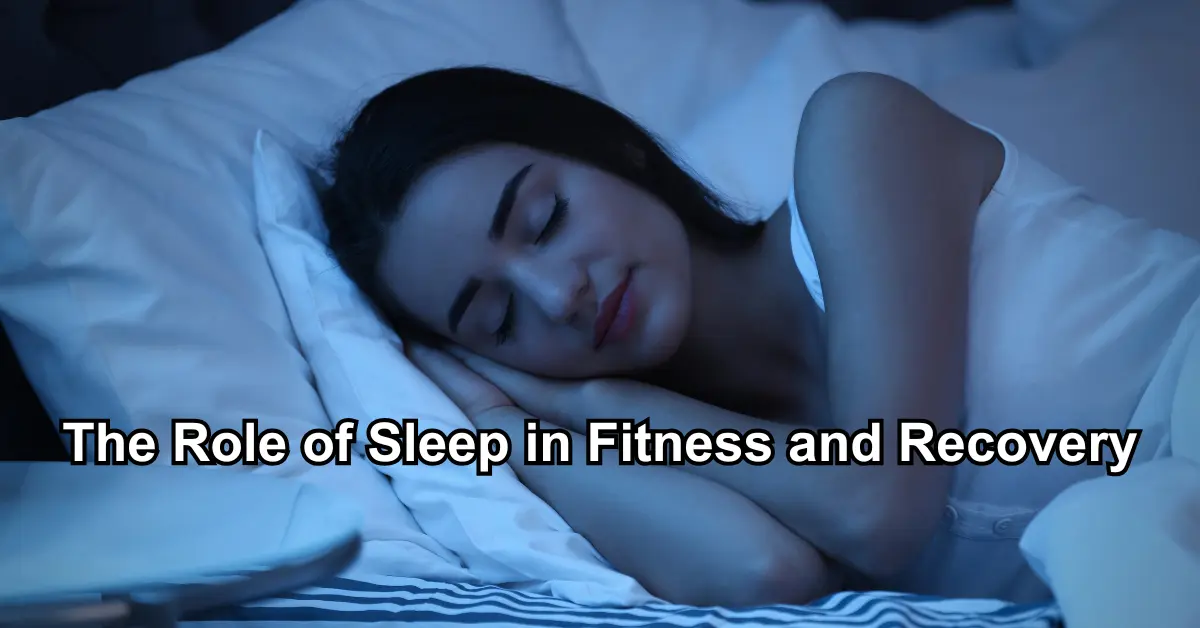
The Role of Sleep in Fitness and Recovery
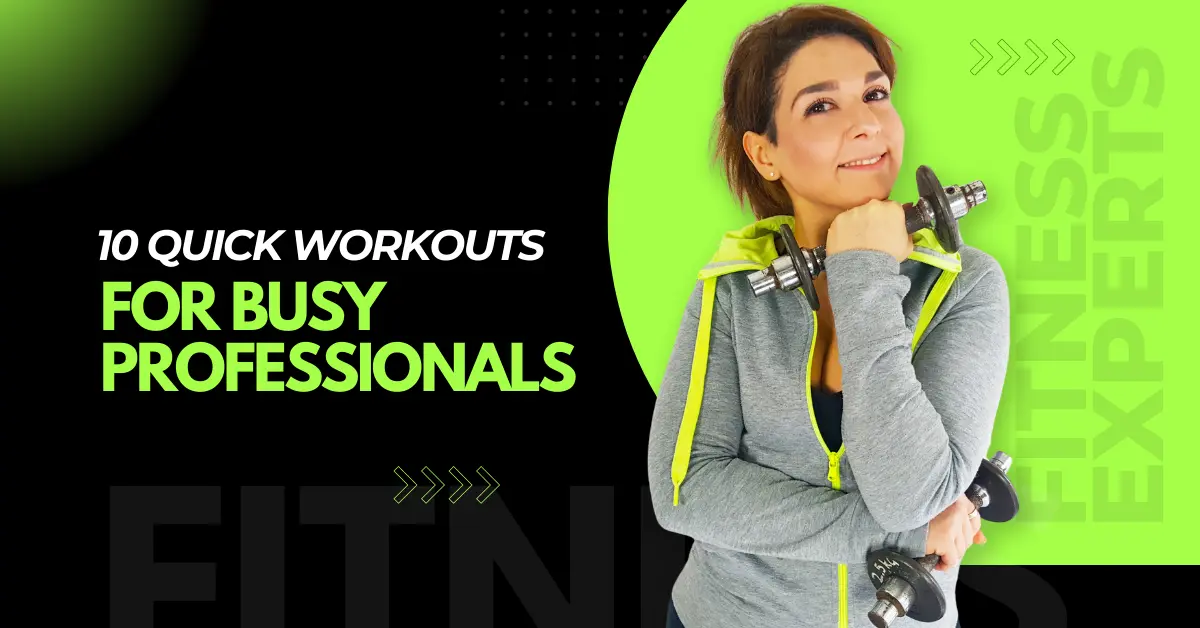
10 Quick Workouts for Busy Professionals


